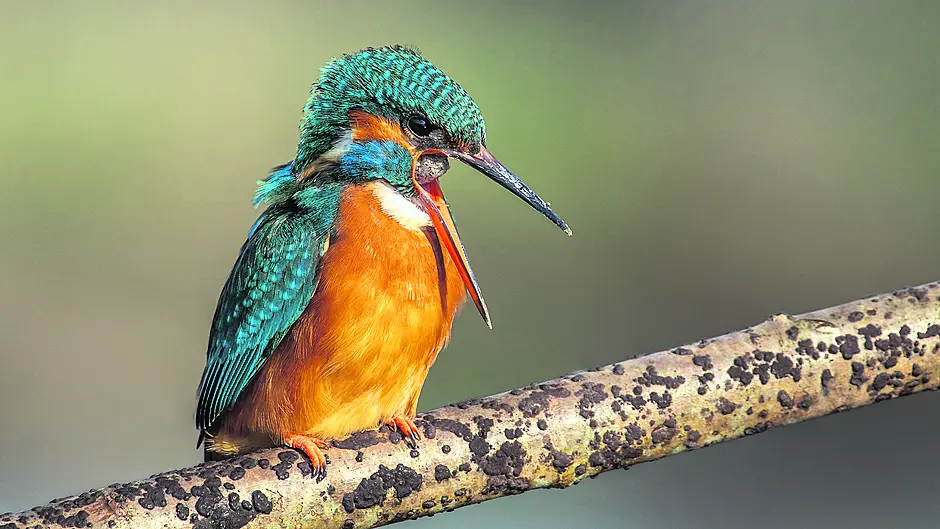A LINE from a Gerard Manly Hopkins poem came to mind recently, ‘as kingfishers catch fire’, when radiant spring sunlight fleetingly lit up the tropical colours of this little creature for me on the river Ilen.
The kingfisher’s plumage is an exotic combination of azure blue on top, rust-red underneath and ketchup-red claws. These extraordinary colours should be hard to miss, nonetheless this is a bird that can be difficult to get a sighting of as it’s small and also very, very fast.
It’s most obvious on the wing – skimming the surface of the water in its distinctive flight, the rapidly-beating wings a blur of electric blue, repeatedly whistling a shrill ‘tiiiii-teeee’ call.
Aside from its unusual appearance, this small bird is also worthy of note for featuring strongly in myth and folklore.
Exotic
The kingfisher is a bizarrely proportioned little bird as its head and beak seem out of scale to its small body. This large characteristic dagger-sharp bill gave rise to one its names in Irish, ‘biorra an uisce’, which means ‘water spear’.
According to legend, this was the first bird to fly from Noah’s ark after the flood and, as its reward, it was granted the ‘blue of the sky’ on its back and the ‘orange of the setting sun’ on its breast. The kingfisher’s beautiful red breast is a result of pigmentation in the feathers, while the glorious iridescent blue on its back is caused by light refraction. And God’s graces, obviously.
These bright colours are really a bit of a mystery as they are the exact opposite of the camouflage generally used by birds to avoid predation. There are different theories as to the reasons for this. One suggestion is that the bird is loudly advertising a warning to predators to ‘keep away, I taste awful’. And this is certainly not a case of false advertising as its strong fishy taste meant kingfisher rarely featured on dinner menus.
Bird of the Gods
The kingfisher was also known as the ‘bird of the Gods’. The idea that the kingfisher brooded its eggs on a nest of fish bones floating on the water was once widely believed.
According to Greek mythology, a kingfisher called the Halcyon built its nest in this way. After laying the eggs, this ‘bird of the Gods’ possessed the power to keep the waters calm.
And so the ‘halcyon days’ were the seven days before and after the winter solstice when the bird was brooding. This gave rise to the expression that is still in use today to describe a period of peace and happiness.
Other fables attached to this bright little bird include its perceived ability to preserve any material with which it came into contact. This led to it being killed and dried to be placed amongst clothing and other items of material to prevent decay in times past in Ireland.
Another old folk belief here and in Britain was that a dead kingfisher, when hung from a thread on a post, will always point its beak towards the prevailing wind. Shakespeare mentions this unusual wind vane in King Lear when he wrote ‘turn their halcyon beaks with every gale and vary of their masters’.
Because of its strong fishy taste, the kingfisher was not hunted as a foodstuff, however, its exotic appearance and rarity did make it attractive to taxidermists and milliners so it was persecuted for its beauty.
The kingfisher is a cosmopolitan bird. With a variety of species found in the tropical regions of Africa, Asia and Oceania, it is also widely distributed in Europe and we have relatively good numbers in Ireland too.
So do find a ‘quiet place’ and be alert for a flash of iridescent blue and a shrill whistle as this bird is all around West Cork. And you will never ever forget your first sighting of this very special ‘bird of the Gods’.
‘It was the Rainbow gave thee birth,
And left thee all her lovely hues;
Get thee on boughs and clap thy wings
Before the windows of proud kings.
I also love a quiet place
That’s green, away from all mankind;
A lonely pool, and let a tree
Sigh with her bosom over me.’
(William Henry Davies)








